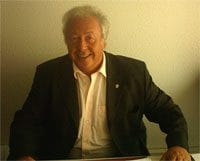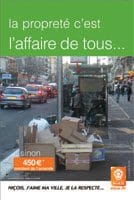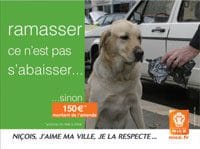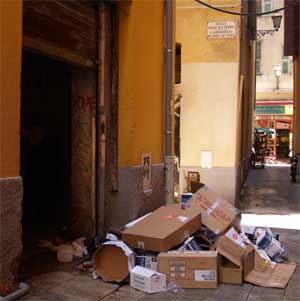Robert Farcy, city council member and deputy delegate for urban cleanliness in Nice, agrees to answer questions from Nice-première.

Robert Farcy, deputy to the mayor, engages in a Q&A for Nice-premiere. Candidly, he discusses problems related to cleanliness in Nice as well as his projects, political future, and the city in general.
At 57, this man is fully committed to improving his city. Available, close to his workers, and politically active, Robert Farcy does remarkable work heading up the city of Nice’s Sanitation Department.
Nice-première: First, what is the role of the Sanitation Department in the city of Nice?
Robert Farcy: It handles the cleaning of beaches, sea water, and watercourses (Paillon), but also all the streets of Nice and the “grand boulevards” (Jean Médecin, pedestrian zone, Promenade des Anglais…) which are washed and cleaned by municipal agents. We also monitor tunnels and tagged buildings and report inconveniences to private companies that handle the cleaning. The collection of bins and sweeping is the responsibility of the territories, and the collection of household waste and large objects belongs to CANCA.
 N.P: What is the workforce like for a service as important as sanitation?
N.P: What is the workforce like for a service as important as sanitation?
R.F: There are 420 agents in total, distributed according to sectors and times of the year: 50 drivers, 120 washers, 12 to 25 people assigned to clean the beaches depending on the season…
We have 20 motor-scooters for picking up dog poop (16 agents), 19 sweepers-aspirators, 15 automatic washers, 6 high-pressure vans (14 agents).
N.P: Again this summer, the assessment of the cleanliness of the beaches was alarming. What are you doing to combat the unsanitary condition of the beaches in Nice during the summer?
R.F: We double the cleaning staff during the summer. This year, the water quality was good. But we always have the same problem: the Ligurian current coming from Italy brings debris onto the beaches, and then we are in a period of atmospheric disturbance with equinox tides… Ultimately, there’s not much we can do to stop the problem since it’s natural. As for people who deliberately damage the beaches, we had three difficult weekends where the beaches were polluted. Unfortunately, there is a rising wave of incivility in the city. We often deal with people who are not attached to fundamental values. We increase the workforce to repair the damage, but we can’t put everyone on beach cleaning…
 N.P: Dog feces are a real scourge for the city. How are you trying to address this?
N.P: Dog feces are a real scourge for the city. How are you trying to address this?
R.F: Obviously, it’s a scourge for all cities, especially in Nice where there are more elderly people and therefore more pets. The motor-scooters are service vehicles and pass regularly through the city, but they cannot ensure daily cleaning. That’s why we’re asking for more civic sense and respect from dog owners.
N.P: Don’t you think the police should issue fines to dog owners since they are authorized to do so and hardly ever do it?
R.F: That’s true. There’s something to be done, a policy to be developed to fight against dog feces. But again, the police seem to have a staffing problem. When you consider that in a city like Cannes, there are twice as many police officers assigned to the environment as in Nice…
N.P: Do the tramway works cause problems for the sanitation agents?
R.F: Yes, of course. We cannot clean places like Avenue de la République, completely upset by the works: barriers, sand, rocks, no tarmac… all obstacles to the smooth running of operations. We should also note that we cannot clean inside the tramway work sites for safety reasons and that some people throw their household waste there, which makes the city even dirtier.
 N.P: Old Nice often becomes unsanitary at nightfall, how do you explain this?
N.P: Old Nice often becomes unsanitary at nightfall, how do you explain this?
R.F: Old Nice is the heart of the city. It is also the most touristic area with a huge concentration of people in a small area. The alleys are washed every day from 3 AM to 7 AM. By 9 AM, the whole city is clean but from there on, it deteriorates hour by hour. In Old Nice, we have to deal with major issues: there is no place for containers, the streets are narrow, there are small stairs, no halls… cleaning is therefore more difficult than elsewhere.
The indiscipline of some is all the more noticeable under these conditions. Dirtiness, everyone sees it; cleanliness does not show…
Just a week ago, I even started a tour of Old Nice with Hubert Boivin to meet with restaurateurs and pub managers to find a solution and address the different problems in Old Nice.
N.P: A more political question: do you act in complete freedom or do you face pressures from Mr. Mayor and his political entourage?
R.F: I have no specific instruction from Mr. Mayor. I am free to act as I see fit. But there is another constraint: that of public procurement… Let’s take a simple but revealing example: I asked for new vehicles upon my arrival at the sanitation service (October 2004) and I still don’t have them. The process is longer and more difficult than for a private company, and that’s a pity.
N.P: A few words about Mr. Mayor…
R.F: Jacques Peyrat is an honest man who gives his all and manages the city well. That’s indisputable. He has undertaken major projects: the tramway, the widening of the Mathis road, the music conservatory. These developments will make the city much more pleasant.
N.P: Personally, what are your plans for the future?
R.F: I feel good in sanitation and plan to continue until the end of my term. In this service, people love their profession and I pay tribute to them. I will try to bring my experience as a private-sector business manager to the public sector. As for my political future, I intend to run for the cantonal elections. I have always been politically active and I want to make progress, go in the right direction; not do politics for the glory and honors.
N.P: To conclude, a few words about the city of Nice and what it evokes for you?
R.F: Nice is a beautiful city in a magnificent region. It’s a little paradise: we have the sea, the mountains. I was born in Menton but have lived here since my early childhood. I am Niçois at heart and proud to be here. We must preserve this beautiful city and it is everyone’s business. Unfortunately, some values have unfortunately flown away. One thing is sure: I love my city and I want it to be clean and for everyone to be happy living here.
Interview conducted by Sebastien Spitaleri.


